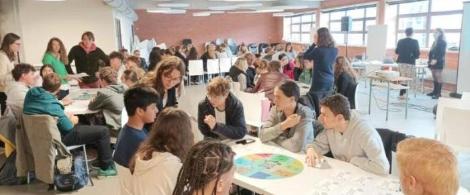In Artois, young people are rallying around the ecological transition of their region
March 2025
Territoires à Energie Positive (TEPOS)
The Artois Metropolitan Pole brings together three inter-municipal communities* and the Pas-de-Calais Department. To scale up the ecological and social transition in its territory, this joint association is relying on young people to certify projects each year. It even asks high school students to raise awareness about the challenges of the ecological transition. Here’s how it works.
‘With the Euralens Label, the Artois Metropolitan Pole (PMA) recognises projects in the region that are exemplary in terms of ecological and social transition. Every year since 2021, candidate projects have been assessed jointly by a committee of the Pôle’s institutional partners, a youth committee made up of high school students or young people supported by local youth employment agencies, and an expert committee,’ explains Lucy Bizet, head of the Euralens Label at the PMA.

‘Following the 2023 Youth Committee meeting, we wanted to involve young people even more in the ecological transition of their region. We decided that the next Committee would be organised by young people, for young people. To achieve this, we worked for six months with the support of a teacher from the Lycée Saint Paul in Lens and with first-year students who we met again in their final year. They worked on raising awareness among their peers and also on sharing their experience by producing two podcasts,’ explains Côme de la Gorce, PMA storytelling manager.
On 17 October 2024, 17 final-year students from the Lycée Saint Paul in Lens welcomed around 60 young people from the region to raise their awareness of the challenges of the ecological and social transition. They used a cooperative game they designed themselves, called Clueco, inspired by Cluedo, which combines planetary boundaries and social justice to assess the impact of local projects such as the deployment of wind turbines or the creation of an ‘electro-mobility valley’.
The afternoon was devoted to hearing from project leaders applying for the label: a photovoltaic power plant on brownfield land in Vimy, the development of a car manufacturing school in Lens, a pathway to health studies at the University of Artois, sustainable and ecological food provision in priority neighbourhoods, and the renaturation and redevelopment of brownfield sites. The selected projects reflect a wide variety of stakeholders and actions. ‘To present themselves to young people, project leaders need to tell their story differently and be able to generate enthusiasm. This also forces them to consider the implications and impact of their project on young people,’ emphasises Côme de la Gorce, while Lucy Bizet points out that ’discovering the ecological transition through concrete projects in their local area helps young people to better understand the issues at stake.’
By entrusting high school students with the organisation of the 2024 Youth Committee, the Artois Metropolitan Pole has enabled young people to have their say and take part in public policy decisions tailored to their needs, desires and demands.